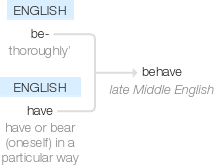Behave
late Middle English: from be- ‘thoroughly’ + have in the sense ‘have or bear (oneself) in a particular way’.
wiktionary
From Middle English behaven, bihabben(“to restrain, behave”), equivalent to be- + have. Compare Old English behabban(“to include, hold, surround, comprehend, contain, detain, withhold, restrain”), Middle High German behaben(“to hold, take possession of”).
etymonline
behave (v.)
early 15c., reflexive, "conduct or comport" (oneself, in a specified manner), from be- intensive prefix + have in sense of "to have or bear (oneself) in a particular way, comport" (compare German sich behaben, French se porter). Cognate Old English compound behabban meant "to contain," and alternatively the modern sense of behave might have evolved from behabban via a notion of "self-restraint." In early modern English it also could be transitive, "to govern, manage, conduct." Related: Behaved; behaving.
